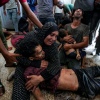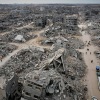Folks embrace subsequent to memorials of victims of the Oct. 7, 2023, assaults on the Nova Pageant grounds in Reim, in southern Israel, on the second anniversary of the Hamas-led assaults on Tuesday.
John Wessels/AFP by way of Getty Photographs
cover caption
toggle caption
John Wessels/AFP by way of Getty Photographs
This story is a part of NPR’s protection of two years because the Hamas-led assault on Israel on Oct. 7, 2023, and the continued conflict in Gaza. For extra reporting, evaluation and totally different views of the battle, go to npr.org/mideastupdates.
JERUSALEM — On a avenue named Gaza lives Israeli Prime Minister Benjamin Netanyahu, in a top-floor residence close to a sushi restaurant.
Outdoors, one current afternoon, a father stood holding a megaphone.
“Bibi and Sara,” he calls out to the prime minister, utilizing his nickname, and his spouse. “It’s Rom’s dad.”
Ofir Braslavsky’s 21-year-old son Rom remains to be being held hostage in Gaza, two years after Hamas led an assault on southern Israel on Oct. 7, 2023, sparking the devastating Gaza conflict.

An Israeli lady holds up a placard displaying a photograph of Rom Braslavsky, who’s held hostage by Hamas in Gaza, exterior Damascus Gate in Jerusalem.
Eyal Warshavsky/SOPA Photographs/LightRocket by way of Getty Photographs
cover caption
toggle caption
Eyal Warshavsky/SOPA Photographs/LightRocket by way of Getty Photographs
As Netanyahu intensified the conflict this 12 months, households of hostages have intensified their very own conflict with Netanyahu — urgent him to strike a take care of Hamas to get their family members again earlier than it is too late.
These households are amongst these in Israel who’ve paid essentially the most agonizing private price of two years of extended conflict.
“I’m not going to let you kill my son and bring him back in a body bag,” Braslavsky shouts.
The price of unprecedented nationwide division throughout wartime
Camped exterior Netanyahu’s residence with different households of hostages was Mor Goddard, who survived the Hamas-led assault on her kibbutz on the Gaza border, however misplaced her mother and father — and extra.
“I lost my trust in the country, my trust in the army. Terrorists entered my house, tried to open the safe-room door, and when they didn’t succeed, they set the house on fire. And nobody came,” Goddard says. “I know what the feeling of abandonment is. Hours when nobody comes. Hours when I hear my friends and parents being murdered.”
On daily basis since, she has mourned the street her nation has taken in its conflict towards Hamas to retrieve the physique of her father, held by Palestinian militants in Gaza as a bargaining chip, and the opposite hostages.
“I think that from Oct. 8 until today, [Israel is] acting out of revenge, and not out of values,” she says. “It’s like a snowball that rolls and rolls and rolls, that you cannot stop.”
That is one price of the extended conflict: Not all Israelis consider in it any extra. A current ballot by the Israel Democracy Institute discovered some 66% of Israelis need it to finish.
“The consensus that … started this war has very much eroded through the time,” says Oren Tene, a psychologist and head of the Public Psychological Well being Institute at Tel Aviv Medical Middle. “When a nation goes to war and is not unified in belief that we are doing the right thing, then the propensity for suffering is much higher.”
The price of a nationwide psychological well being disaster, together with amongst troopers
Within the final two years, Israel’s army has battered its enemies and reshaped the area, with its troops invading components of Lebanon and Syria, and putting Yemen and Iran, all whereas finishing up a lethal army marketing campaign within the Gaza Strip.
At residence, Tene has tracked an increase in using anti-anxiety medicines like Valium and Klonopin. The 12-day conflict with Iran in June was particularly traumatizing, as Iranian missiles pounded Israeli cities and households slept in bomb shelters. He is seen an inflow of sufferers.

An Israeli military soldier stands earlier than the memorial of a sufferer of the Oct. 7, 2023, assaults on the Nova Pageant grounds in Reim, in southern Israel, on the second anniversary of the assaults on Tuesday.
John Wessels/AFP by way of Getty Photographs
cover caption
toggle caption
John Wessels/AFP by way of Getty Photographs
“They don’t sleep well. They can’t concentrate, they feel worried all the time. They don’t know if they have a future here,” he says.
After the Oct. 7 assault, Israel relaxed gun license guidelines, and issued hundreds of firearms a day to civilians shaken by the assault, giving rise to elevated instances of home violence, in response to authorities.
Tene has additionally handled younger troopers getting back from Gaza traumatized by survivor’s guilt, watching their mates get killed alongside them. A complete 466 Israeli troopers have been killed in Gaza, with a excessive charge of pleasant hearth accounting for 15% of soldier deaths, in response to army figures.
He says he has handled many troopers who acknowledged taking pictures Palestinian civilians, and who’re experiencing what psychological well being practitioners name ethical harm or ethical trauma.
“Many people describe the fact that they have betrayed their values,” he says. “If you shot a child, the child walks with you.”
The price of apathy to Palestinian struggling
What troopers see in Gaza, most Israelis don’t see. Israeli information has largely shielded audiences from it.
That’s one other price of the conflict for Israelis: a lack of empathy for Palestinian struggling.
Keren Gill, an economist attending an indication to finish the conflict and free the Israeli hostages, is unhappy to see her sympathies towards Gaza change a lot within the final two years.
“Before Oct. 7, my thinking was, there are families there and there are people who want to live quiet and have their own life,” she says. “But today, I don’t think that anyone in Gaza is innocent.”
She is appalled by Israeli hostages’ accounts of some being held captive in households’ houses. The army says some have been held captive within the residence of a Gaza physician.
“Is it reasonable that a doctor in Gaza was taking hostages to his home? I cannot believe it happened. So for me, I don’t care about the Gaza people,” she says.
The try and construct empathy
An Israeli researcher of Center East politics is making an attempt to assist restore empathy. Assaf David constructed a web-based following by translating to Hebrew the Fb posts of extraordinary Palestinians in Gaza.
This put up obtained numerous consideration, written by a father in Gaza, Saed Abu Eita. Roughly translated, it says: “This is my picture with my daughter Mira before the war. I love her very much. I lost her. I didn’t get the chance to say goodbye to her, and I don’t know who buried her.“
“It got a lot of reaction from Israelis, which was a surprise to me, because I didn’t think that Israelis cared much about the suffering of Gaza,” David says.
He believes social media posts from Gaza assist skeptics in Israel acquire consciousness of the prices Israel has exacted on Palestinians within the conflict.
“ I’m too terrified to think about the long-term costs of this lack of empathy, because it feeds on itself,” David says. “The psychological costs and mental costs and ethical costs, they affect your soul, and these will be the hardest costs to compensate.”
The price of world fury at Israel
Protests towards Israel’s conflict are frequent throughout Europe. Israeli authorities have documented assaults on Jews and Israelis overseas all through the conflict. Worldwide sports activities and music competitions are contemplating bans on Israeli participation. Nations are imposing weapons embargoes, together with Israel’s staunch ally Germany.

Protesters march with Palestinian flags throughout an indication underneath the motto “Draw the red line with us: Together for Gaza!” close to the Brandenburg Gate in Berlin, on Sept. 27. Tens of hundreds of demonstrators marched by way of the streets of the German capital to demand that Israel halt its army marketing campaign in Gaza.
Ralf Hirschberger/AFP by way of Getty Photographs
cover caption
toggle caption
Ralf Hirschberger/AFP by way of Getty Photographs
From world sympathy within the days that adopted the Oct. 7 assault, Israel is preventing genocide and conflict crimes accusations in worldwide courts.
The Israeli authorities has warned Israelis to decrease their profile overseas, and delete social media posts about their army service. Some nations have pursued conflict crimes fees towards visiting Israelis who’ve served within the army.
That hasn’t stopped them from touring.
The price of touring the world as an Israeli
The Tel Aviv worldwide airport is Israelis’ gateway to flee the depth of life at conflict. That escape route is not a given — worldwide flights have been canceled repeatedly with missile hearth from Yemen and Iran.
Within the departure corridor is Oshri Avata, 25, touring to the Japanese European nation of Georgia after a number of excursions of responsibility in Gaza and Lebanon serving in an elite undercover unit. Whereas the remainder of his unit is doing group remedy with a psychologist to course of their experiences, he skipped out.
“I ran away from this. I don’t wanna do that. I wanna fly. I wanna see the world … this is another kind of treatment,” he says.
One other traveler is Aviv Hajaj, 30. She was presupposed to fly to Paris to see Beyoncé carry out this summer season, however the conflict with Iran canceled her flight. She is nervous earlier than boarding a flight to Athens, Greece.
“ I probably will not speak in Hebrew at streets or metros or stuff. So it sucks,” she says. “The fact that we need to be scared to travel the world … I just want it to be over.”
“Our story will have a good ending”
Stickers cowl the partitions of the airport car parking zone bear the smiling faces of younger Israeli troopers killed within the conflict.
One sticker stands out, with a quote from a mom’s eulogy to her son, a soldier killed in Gaza: “Our story will have a good ending.”
When the conflict does finish, Israelis will start to reckon with the prices they’ve paid during the last two years.
NPR’s Carrie Kahn contributed to this report from Tel Aviv, Israel.









